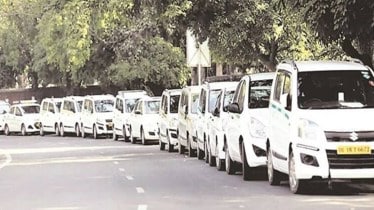A major section of drivers attached to online ride hailing platforms like Ola and Uber in Chennai went on a two-day strike, starting Monday, demanding fare regulation, prohibition of bike taxi services like Rapido in the city and protesting alleged high commission charged by cab aggregators and what they called “unlawful” toll booths across the state.
The protesting cab drivers said that “illegally operating” toll booths and bike-taxi services like Rapido are eating into their earnings.
They have threatened a massive protest in Chennai on October 18.
The drivers staged an agitation in the city, urging the Tamil Nadu government to immediately intervene and regulate app-based cab aggregators.
The taxi workers’ union has been insisting that the state government launch its own app to provide aggregator services, ban bike taxis and fix fares for all taxis.
The All India Road Transport Workers Federation (AIRTWF) and the Tamil Nadu Urimai Kural Drivers Trade Union spearheaded the strike.
A representative of the Tamil Nadu Call Taxi Workers’ Union told FE that the Union government’s norms on the motor vehicle aggregators issued in 2020 had not been implemented in the state yet.
He said the lack of rules affects both drivers and commuters, as a regularion would help fix a fair fare for commuters and ensure better renumeration for drivers.
The protesting cab drivers FE spoke to said that they were being exploited by aggregators, which have been denying them the commission they are demanding.
The strike impacted commuters, especially office goers who normally depend on app-based ride hailers on a regular basis.
“We understand that the strike has affected commuters, but the larger issue, which is our livelihood, cannot be ignored. We have decided not to open the app for two days,” said Raju, a protesting driver.
According to rough estimates, there are nearly 70,000 autos and over 60,000 taxis plying in and around Chennai.
Recently, Rapido has been in the line of fire in Karntaka and Delhi, with online taxi aggregators seeking a ban on the service and taking the issue to courts.
